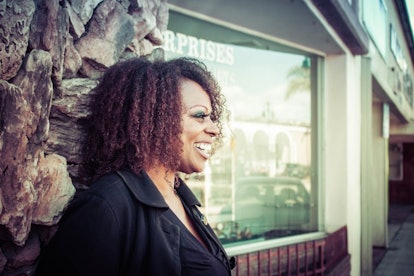Daily Habits That Indicate There Might Not Be Any Passion Left In Your Relationship
While it's normal for the intensity of new love to wane a bit time, it's not so normal for the passion to completely fade from your relationship. Yes, you'll settle into a comfy routine. And yes, your busy lives can get in the way. But it's still important to watch out for signs of a fizzling spark, and then do what you can to bring it back.
"It’s quite common to find yourself in an emotional or sexual rut with your romantic partner," Weena Cullins, a licensed marriage and family therapist, tells Bustle. "As creatures of habit, it’s easy to lean into routines versus fighting to keep the passion alive in our relationships." Which is what you'll have to do, to some degree, should you want to keep things healthy.
The good news is that it doesn't have to be difficult. And often, all it takes is some open conversation. "Practice and encourage open communication about your level of connection regularly," Cullins says. "This looks like having a weekly 'state of the union' check-in with your partner about the level of closeness or distance you feel toward each other."
If it's obvious there's a problem, start to work on it together, and keep talking. "Always make sure to check back in after making an effort to improve things after a period of time," Cullins adds. That way, if one or both you feels that passion slipping away, you'll be able to get things back on track. Read on for some signs it may be time to make a change.
1. You Choose Sleep Over Sex Most Of The Time
Hey, if you need to get some shut eye, I'm a firm believer in in doing so at all costs. That said, if you prefer sleep over sex — even on the nights you're not particularly tired — take note. "Couples in the early stages of a romantic relationship tend to choose opportunities for intimacy over other tasks or even obligations," Cullins says. "However, when the passion has faded it’s not uncommon for one or both partners to find themselves choosing to catch up on rest versus making love; especially if sex has become routine."
2. You Don't Check In With Each Other
It's impossible to be 100 percent involved in each other's lives. And you really shouldn't be, anyway. But that doesn't mean it's healthy to completely ignore one another during the day. "In thriving relationships, partners like to check in with each other throughout the day or when the other is hanging out without their partner," Cullins says. "When the passion wanes, some partners stop checking in. Whether they know each other’s whereabouts or not, the need to be connected while away from each other becomes less of a priority."
3. Things Have Gotten Stale In The Bedroom
Perhaps the most obvious sign of waning passion? A boring sex life. "It’s normal for couples to develop a sexual rhythm over time, but sexual creativity can keep a solid relationship thriving," Cullins says. "Couples who have lost the passion in their relationship tend to rest on their sexual routine versus sparking their creative juices in the bedroom to reignite the flame." It's important to keep things fun, one way or another, until you get through this slump.
4. Or, You're Not Having Sex At All
OK, so maybe this is the biggest sign of a lack of passion: no sex at all. "Sex isn’t everything — but it can be a barometer of the passion and the health of a relationship," says New York-based relationship expert April Masini. "When you express yourself with sex, you’re creating a special bond in the relationship. Likewise, when you don’t, you lose that special glue that holds things together." And that's not good.
5. You Don't Touch Each Other Throughout The Day
It seems like such a little thing, but it could be a sign if your sweet little intimate moments have gone away. "Pats on the butt, random hugs in the kitchen, and cuddling on the couch increases when activity in the bedroom is hot," Suzanne Casamento, founder of Fantasy Dating, tells Bustle. "When you feel connected intimately, you're more apt to show affection through touch outside of the bedroom. Conversely, when you're not intimately in touch, you won't be physically in touch."
6. And You Never Make The Time To Talk And Laugh
Silence can cause passion to fade. And, it can even be a sign that it already has. "When the only conversations you have are, 'How was your day?' and 'What do you want for dinner?' you stop connecting on an intellectual and emotional level," Casamento says. "Real conversations foster real connection which fuels good sex. So, if you're not talking about ideas or sharing personal stories or dreams, start by asking open-ended, 'What if?'-type questions. You might just find out something so amazing about your partner that you'll want to make out with them."
7. You Always Stay At Home
It's expensive to go out to dinner, so I totally understand why that might not a possibility every week, or even every month. But if you're ordering in every night and then eating on the couch, it might just mean laziness has set in. "Don’t wait for an anniversary to put some spark back into things," says Bonnie Winston, a NYC-based celebrity matchmaker and relationship expert. "Try getting dressed up and going out for a date night instead." Even if it just means walking around the park.
8. You've Both "Given Up" On Your Appearance
The best part of a relationship is getting to that stage where you can be super comfortable with each other. Be careful, though, because this can be a slippery slope into a passionless situation. As Winston tells me, there's always room for a little lingerie or whatever else makes you feel sexy, all in the name of reigniting that spark.
9. Your Hobbies Include Binge Watching TV — In Total Silence
We all need to veg out, and that's OK. But things can get pretty damn stale if you both make a habit of staring into the TV without acknowledging each other. As Winston says, the lack of interaction during a TV binge can be a sign of a lack of passion. So make an effort to spice things up. "Try going out to a show," she says. "Or an activity where you can interact and share opinions."
10. You Guys Never Eat Dinner Together
Schedules don't always match up, so it's not the end of the world if you two can't eat dinner together. But that doesn't mean you should let this tradition slide, if you can help it. "If weeks go by and you can't remember the last time you sat down for dinner together, or breakfast on the weekend, the passion in your relationship may be fading," says therapist Kimberly Hershenson, LMSW.
11. You Part Ways Soon After Arriving Home
Again, it's important to have separate lives and time spent alone. Take note, however, if you two part ways immediately every night. "If either of you come home from your day at work and would rather be alone watching TV or out with friends instead of with your partner, this is a sign the passion may be gone," Hershenson says. You can get it back, though, with just a little bit of effort.
While keeping in mind that it's totally normal for intense passion to fade as a relationship goes on, it never hurts to watch out for these signs, and then communicate your worries to your partner. Together, the two of you can find ways to bring back that spark.
Images: Unsplash, Elizabeth Tsung; Pexels (11)
By Carolyn Steber Aug. 9, 2017Sex & Relationships
How To Tell If Your Insecurities Are A Sign Of Relationship Anxiety
It's more than just feeling jealous now and then.
martin-dm/E+/Getty Images
By Kristine Fellizar Sep. 30, 2021
You love your partner and you trust them completely, and yet, every time they take longer than 30 minutes to answer a text, you start to worry. Are they ignoring you? Did you say something weird? Did you accidentally offend them? Or maybe you get extremely nervous every time your partner talks about something funny their new co-worker did. How often do they talk? Is your partner secretly attracted to them? It’s normal to worry about your relationship every now and then, but if those worries are hurting your relationship or taking over your life to the point that you can’t focus on anything else, you may have relationship anxiety.
As Christine Scott-Hudson, psychotherapist and licensed marriage and family therapist, tells Bustle, “Relationship anxiety is when a person experiences extreme worry about their relationship. These worries can be about the past (such as worries over your significant other’s exes), the present (worries related to being good enough for your partner, or about your partner developing feelings for someone at work), or the future (fears that your partner will leave you for someone else or move away for a job opportunity).”
Unlike other forms anxiety, like general anxiety disorder or social anxiety disorder, there isn’t a specific diagnosis for relationship anxiety due to its exclusion from the Diagnostic and Statistical Manual of Mental Disorders. However, Susan Zinn, licensed therapist and certified trauma specialist, tells Bustle. “Mental health and wellness professionals are aware of this type of anxiety.”
Relationship Anxiety Vs. Typical Relationship Concerns
It’s common to have worries over your relationship, especially when you’re in the early dating phase. After all, if something is really important to you, it’s normal to be protective over it. If you haven’t officially defined the relationship and you’re really into your partner, there’s even more to be nervous about.
According to Zinn, relationship anxiety can be defined as, “intense worry and fear about a romantic or friendly relationship hindering a person's ability to function in that relationship.” Even if things are going well, a person with relationship anxiety may end the relationship or self-sabotage as a result of constant worry, insecurity, or doubt.
Needing excessive reassurance, self-silencing one’s thoughts and opinions to please or accommodate their partner, constantly doubting the relationship’s long-term potential, and participating in behaviors that may sabotage the relationship are other things that tend to happen when someone has relationship anxiety.
“Their anxiety may not result from anything in the relationship itself, but it can eventually lead to behaviors that do create issues and distress for them and their partner,” she says. “If anxious thoughts grow into excessive fears or worry and creep into a person's daily life, this would be a time to seek professional support.”
What Causes Relationship Anxiety?
Relationship anxiety is highly correlated with codependence, low self-esteem, and trauma, Scott-Hudson says. Negative past experiences even as far back as childhood can contribute to someone developing relationship anxiety. For instance, someone who felt abandoned by a parent may fear being left behind by a partner. Someone who was cheated on in a past relationship may also develop relationship anxiety and will act out based on those fears.
“What happens is, a person uses the relationship as a way to cope in unhealthy ways, much like an alcoholic would use alcohol or a shopaholic uses purchases in order to regulate their own moods,” she says. “If things feel like they are going well in the relationship, the person may temporarily feel regulated.”
For example, if a person with relationship anxiety isn’t hanging out with their partner for one day, they may get extremely nervous about what their partner is doing and who they might be with. They may have a heightened sense of anxiety throughout the day until they hear from their partner and know exactly what’s going on with them.
“The same way an alcoholic may stop off at the bar on the way home from work in order to attempt to regulate their own mood, a person with relationship anxiety may constantly feel the need to check in on their partner to alleviate their own elevated anxiety over the relationship,” Scott-Hudson says.
How To Cope With Relationship Anxiety
Like other forms of anxiety, coping with your relationship concerns will take some time and patience. Since some fears are deeply rooted, you may still experience moments of extreme worry or distress. However, there are things you can do to manage those fears in a healthy way.
To start, be mindful and aware of your patterns. If you’re comfortable enough, open up to your partner and have an honest discussion about your concerns. “Unresolved emotions build if they aren’t addressed, so communication is critical,” Zinn says. “Even when someone is in a loving relationship, past trauma and attachment styles can hinder the relationship if there is not a commitment to change old behavior patterns. Being more present can help to keep anxiety from spiraling.”
Practicing self-regulation skills like going on a brisk walk or repeating affirmations like “I am safe” or “I love myself” can be really helpful. Scott-Hudson also suggests waiting 15 minutes before checking in on your partner instead texting them multiple times in a row.
Lastly, consider therapy if you think it will be helpful. A professional can help you move forward from past trauma and give you helpful tips for the future.
Sources
Christine Scott-Hudson, psychotherapist and licensed marriage and family therapist
Susan Zinn, licensed therapist and certified trauma specialist
Check Out The
Special Offers On Etsy
👇













Write first comment